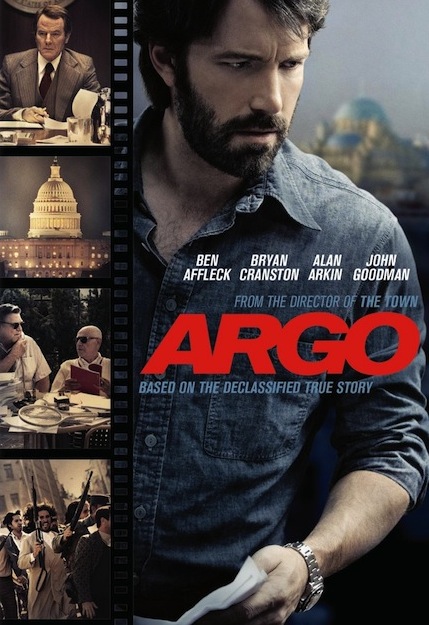Is Argo worth a watch? No doubt.
Was it worth an Oscar? Not given its competition, in my eyes, as I wrote at the end of my post-Oscars post last week. But the fact that Argo is merely one of my top five or so movies of 2012 rather than the number-one pick ain’t bad. Some thoughts on it that include mild spoilers follow.

Ben Affleck’s feature debut as a director, 2007’s Gone Baby Gone, was very good.
The Town, his 2010 follow-up, was pretty good too — a heist film that due to its action elements and unconventional romantic angle predictably did bigger box office than Gone, a measured, even more character-based murder mystery. So it was as much Affleck’s track record as interest in the subject matter and critical acclaim that prompted me to see Argo.
Argo is just one of several notable films of the past year that revisits events whose outcome is history yet which dramatizes the road to that outcome with suspense: The Iran hostage crisis occurred while I was 9-10 years old. I have a more than vague but far less than comprehensive recollection of it, about what you’d expect for a kid that age. Before the publicity for Argo ramped up, I was honestly more familiar with the Jack Kirby drawings done for the proposed film and theme park based on Roger Zelazny’s novel Lord of Light — what inspired the fake movie within the movie Argo — than with the specifics of what became known as “the Canadian Caper” itself.
For those of us who lived through the ’70s one of Argo’s joys is the sense of period.
The film opens, to a chuckle from the audience, with an era-appropriate Warner logo; the hairstyles, set decoration, and vintage TV clips follow suit. Argo was a completely immersive experience that really impressed my companion and me — relating a tense, fascinating, ultimately triumphant part of the hostage crisis that we knew little about.
When the film was over we agreed that, first, it was even more satisfying than we’d expected and, second, the climactic scene at the airport had darn well better have been a crazy “truth is stranger than fiction” moment rather than an invention of screenwriter Chris Terrio. You watch these seven Americans — CIA agent Tony Mendez, played by Affleck, and the embassy workers he’s put himself in jeopardy to rescue — trying to convince skeptical Iranian security guards to let them board their plane, intercut with Iranian kids in a sweatshop piecing together shredded documents that will reveal the workers’ faces, and the manipulation is as palpable as the suspense that you can’t help but feel anyway. I remember thinking while watching the scene that no matter how much of it was real the filmmakers shouldn’t have laid it on so thick because it was just so unbelievable. When I found that out it was in fact all dramatic license I wanted to sentence Affleck and Terrio to dramatic remedial night class.
The larger story is true — and fascinating. Mendez did orchestrate a successful cover story casting those half-dozen Americans as members of a film crew scouting locations for a fake sci-fi extravaganza called Argo. Everyone acts the hell out of the material. It didn’t need the embellishment. Discovering that (in spite of some last-minute epilogue rejiggering) the film didn’t accurately reflect the contributions of the British and New Zealand diplomats as well as the refugees’ Canadian hosts disappointed me further.
One more quibble that I have is that the artist whose conceptual drawings were used
for Argo’s Argo is identified in the end credits as Jack Kirby. Kirby did actually do the drawings repurposed in real life for the Iran caper, as I mentioned above, but the actor seen fleetingly onscreen — whose character is never referred to by name — looks absolutely nothing like the man. It’s a small thing that wouldn’t have bothered me if
the credits and press material didn’t identify him, or if someone in Kirby’s general physiognomic ballpark had been cast. Moreover, I realize that the vast majority of the viewing audience will neither know about this nor care if told. Lack of attention to such things, however, always makes me wonder to what else little care has been given, and sometimes the answer ends up being “too much”.
Related: A Spoonful of Sucralose • Projections •
Here Am I Sitting in a Tin Can, Far Above the World

As I mentioned in your Oscars post, I didn't mind Argo winning the big prize, and though it wasn't my favorite of the nominees nor preferred pick to win, it was one of my favorite films of the year as well, and I did greatly enjoy it.
ReplyDeleteLike you, I was a bit saddened to learn how fabricated the ending was, yet I was still amazed at how well Affleck was able to build tension around something I already knew the outcome of. Even if the events on display were 100% fictional, it would have been a notable achievement for building as much tension into a known story as it did.
the actor seen fleetingly onscreen — whose character is never referred to by name — looks absolutely nothing like the man.
Yeah. On the one hand, I was pleased to see the role credited as Jack Kirby, since it meant someone involved in the production was aware of Kirby's contributions. On the other hand, I was disappointed that they couldn't cast someone in the ballpark of Kirby's physical appearance. I mean, it isn't like it would have been hard to find someone who looked vaguely liked Kirby - he was a pretty ordinary looking kind of guy. The actor they cast was almost laughable for how unlike Kirby he looked.